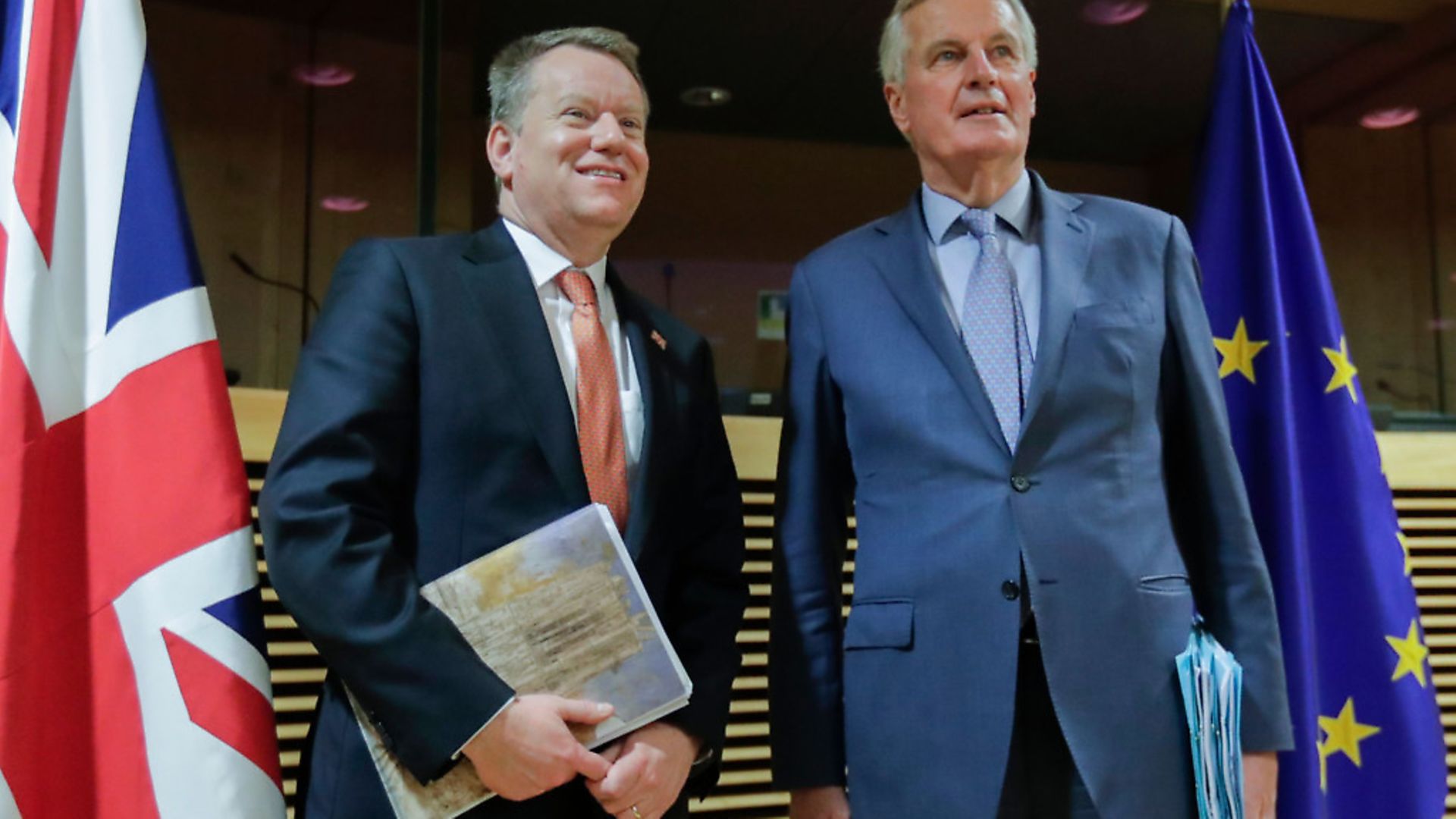
While our attention is elsewhere, we are hurtling towards a catastrophic no-deal, says Caroline Voaden. She says the government must urgently rethink its Brexit strategy.

It’s hard to believe that something which had dominated our lives for so long – Brexit – has almost completely fallen off the radar.
After the shock of the December general election, and the brutality of losing our jobs and heading home from Brussels in January, we former MEPs were geared up for the long haul of holding the government to account as it ground its way through tortuous post Brexit trade negotiations with the EU. And when Boris Johnson spoke of ‘healing the rift’ between Leavers and Remainers, it seemed an impossible idea.
Little did any of us think a global pandemic would sweep across the globe and make those two words almost redundant within weeks. We are now a people divided between frontline workers and those who stay at home, the vulnerable and those less at risk, the sick and the well.
But while many people have far more urgent things to concentrate on, it is vital that some of us don’t take our eyes off what’s happening with Brexit. The transition clock is ticking loudly and it’s only a few weeks until the UK has to decide whether it will ask for an extension to the transition period that is due to end on December 31.
Senior Europeans say that while the case for an extension is overwhelming, there is little appetite for it on the UK side. And while the government might be tempted to use Covid-19 to camouflage the disaster of a crash out from the single market and customs union at the end of the year, the costs will be high – and less affordable than ever.
This government, picked for its adherence to the Brexit mantra rather than its ability to steer us out of the Covid-19 crisis, still seems hell bent on crashing out, rather than looking at the changed landscape we now find ourselves in and accepting that not only we, but other governments too, have other things to think about.
We are so far away from reaching an agreement with the EU that it is fantasy to assume it is now possible. The timeline was extremely tight to begin with, but after talks stalled due to illness and isolation, the prospect of a deal has become even less likely.
And the UK’s refusal to make their negotiating mandate public is infuriating EU capitals. They don’t even know what the UK side is aiming for.
‘The problems are immense: the British texts, which are not made public, don’t cover a number of key priorities,’ says one senior European who is well aware of what’s happening in the negotiations. ‘Nothing substantial on a level playing field, no text whatsoever on fisheries so far, no recognition of the role of ECJ or ECHR, no commitments regarding climate change, no certainty in the protection of data… The political declaration is forgotten.’
The source said there was nothing concrete so far on how the UK sees its relationship with EU security or defence policies but by contrast they are making huge demands about access to European data, with no strings attached.
‘More generally, there is an aggressive tone which hurts and doesn’t help. There are many reasons why the talks are only talks, and not proper negotiations. The risk of a no-deal is serious and obviously a scenario which has some traction in London.’
During a remote meeting of the UK-EU Friendship Group set up by MEPs before the UK contingent headed home, Polish MEP Radek Sikorski (European People’s Party) said: ‘We should all prepare ourselves for a super hard Brexit at the end of this year.’
And French MEP Nathalie Loiseau (Renew Europe), said: ‘The pace of negotiations is pretty slow. There’s very little progress. We ask for no posturing ideology, but for care for individuals and businesses who will be affected by this.’
The feeling in Brussels is that the UK still wants an agreement with all the benefits, but with minimal obligations. Their language is couched in ideology and hubris. Never mind the details of what being a ‘third country’ means in reality, fulfilling an election promise still seems far more important – regardless of the fact that whole world order has fundamentally changed.
A quarter of UK businesses have temporarily closed their doors because of the coronavirus pandemic and the government is paying the wages of one in five workers. Smaller companies, family businesses, the self-employed are feeling the pain hardest.
Budget forecasters say Britain’s economy could shrink by 13% this year, its deepest recession in three centuries, and public borrowing is set to surge to a post-Second World War high. The budget deficit could hit £273 billion – five times its previous estimate and equivalent to 14% of GDP. For comparison, it hit 10% after the global financial crisis and had been gradually reduced to around 2% after a decade of austerity spending.
So we’re facing a budget deficit way higher than we saw in 2008, at a time when the country needs anything but more austerity spending.
The results of this policy have been laid bare for all to see during the pandemic – from nursing shortages to a lack of basic equipment in the NHS, and the shambolic state of our social care system, which no politician has been brave enough to address.
Things will be bad enough by December. To add the economic shock of a no-deal Brexit to this would be madness. And incomprehensible that any government would wish that combination on itself, let alone its citizens.
UK businesses will need every avenue open to them to have a hope of surviving the shock. But with no willingness on the UK side to agree to a level playing field on social and environmental concerns, and the difficult issue of fishing, it looks unlikely that the EU will be granting us access to its single market.
There is no free trade deal in the world that replaces membership of the single market and customs union – the most advanced trading models ever created. And no government has the time or resources at the moment to create something similar for a country that has become the first and only in the world to want a new trade agreement that gives it less access than it already had.
As Best for Britain, the campaign organisation, says: ‘It’s not reasonable to expect the UK to replace all our existing trading relationships during a global lockdown – nor is it fair to expect other nations to prioritise negotiations with us. We need the entire world focused on controlling Covid-19 and dealing with the fallout.
The totemic industry during the Brexit campaign was fishing. And it’s raising its head again. ‘The EU negotiators are clearly linking fishing to access to the EU market. No agreement on fishing, then no preferential access to the single market. So far, the UK has withheld its legal text on fisheries and this is causing serious frustration on the EU side,’ said another EU source.
The UK fishing industry has been all but grounded, not helped by the shutdown of the entire hotel and restaurant market. How long before that picks up? And as the industry creaks back into life can it really face the prospect of having access to its European markets removed? Don’t forget, 60% of the fish we catch in the UK is destined for European markets.
Another sector that is in a desperate situation is freight transport – nearly a quarter of UK logistics companies face potential collapse in the next few weeks. In other circumstances it would be frantically preparing for the December deadline, but the industry is wrestling with Covid-19 instead.
‘There is simply not enough capacity available to plan the major structural changes needed to implement a successful departure from the EU, as well as… dealing with unprecedented pressures caused by Covid-19,’ said Elizabeth de Jong, policy director at the Freight Transport Association. ‘Our industry needs the support of government, not to be broken by it.’
Sometimes things just don’t go according to plan. To be fair to the Conservatives, and to Boris Johnson’s government, they weren’t expecting a global pandemic when they fought the election on a Brexit platform. But things have changed and 64% of the British people now believe it’s right to ask for an extension to the Brexit transition period, given the circumstances we find ourselves in (even one in five Brexit Party voters agreed). It’s time for a rethink at No.10.
• Caroline Voaden is a former Liberal Democrat leader in the European parliament and the party’s special advisor on European relations.
Warning: Illegal string offset 'link_id' in /mnt/storage/stage/www/wp-includes/bookmark.php on line 357
Notice: Trying to get property 'link_id' of non-object in /mnt/storage/stage/www/wp-includes/bookmark.php on line 37






